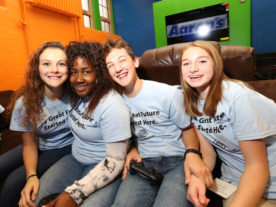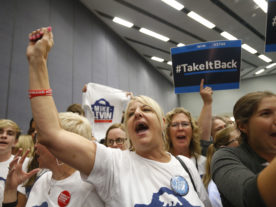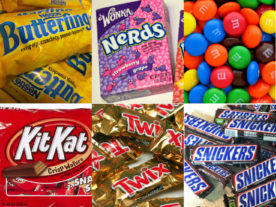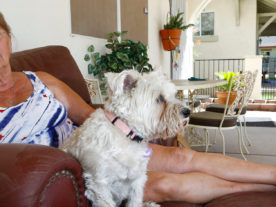Over 85 million families in the United States own a pet. That’s 68 percent of households, according to a 2017-2018 survey conducted by the American Pet Products Association.
Just 30 years ago, when the survey was first conducted, 56 percent of households owned a pet.
The survey found dogs are the most popular pets, with 60.2 percent of households owning one. Cats are the second most popular, with 47.1 percent reporting they had a cat. Freshwater fish came in third, at 12.5 percent.

In this Thursday, Dec. 18, 2014 photo, a cat rests on the throne bed in the King Tut-theme cat playroom at the Oregon Humane Society in Portland, Ore. Modern-day cats have not yet become associated with deities as they were in ancient Egypt, but the Internet has gotten them a little closer. (AP Photo/Don Ryan)
Pets are increasingly popular among Americans, particularly in the past 10 years, according to Nicki Dobson, who runs marketing and communication for Three Dog Bakery, the “original bakery for dogs.”
“Pets are becoming so important,” she said. “People are having more pets and less children. People are concerned about what they eat. Our whole premise was trying to make things with human-grade ingredients and a focus on nutrition. They look like human food, but they’re meant for pets.”

A dog digs into a special dog cake baked by Three Dog Bakery.
It’s not just food.
Another company, Posh Puppy Boutique, sells clothes, jewelry and other accessories for dogs.
There are also pet hotels, pet spas, pet-oriented parties and various other ways to pamper a furry friend.

Pets of all shapes and sizes dress in their festive holiday apparel to visit with Santa at a Dallas PetSmart on Saturday, Dec. 14, 2013. Last year the PetSmart Santa Claws Photo Event raised $770,225 for more than 2,300 animal welfare groups. (Richard W. Rodriguez/ AP Images for PetSmart)
All of this pampering adds up, with one survey finding that Americans spend $126.19 every month on their pets.
Three Dog Bakery, which opened in 1989, provides some insight into how fast the pet market is growing. According to Dobson, they have 45 bakeries around the globe, including in Canada and China.
It also has a large online presence, catering to the millennial generation, she added.
She said cakes are the most popular item and that often she’ll hear owners say, “I just took my dog to the vet, so I wanted to make it up to him,” or “We just neutered our dog and wanted to make it up to him.”
“We have dogs come in every week,” she said. “Their dog needs a cookie every night. We have people who drop $50 to $75 on [dog] pastries every week.”
Younger Americans in particular seem to be choosing pets over having children, and they’re making big life decisions, such as buying a home, around their pets.
For example, a 2017 survey from SunTrust, a banking and mortgage company, found that 33 percent of first-time home-buying millennials say that a good yard or good space for their pets influenced them to buy a new home. That compares to just 25 percent who cited marriage, and 19 percent who cited the birth of a child.
In an effort to woo potential millennial employees, some companies are offering pet benefits such as pet insurance and “pawternity” leave, giving workers free time to spend with their new pets.
Dobson noted that a new trend is taking dogs to work.
Americans’ love for their pets are even influencing their travel plans.
A recent survey found that 49 percent of pet owners haven’t left the country since owning their pet. Sixty-eight percent of those said it was because they feel guilty leaving their pets alone.
“It’s a sad fact for pet owners that vacation planning can be such a hassle. Nearly a quarter we surveyed (23 percent) only take a vacation once every few years. Some even less often than that,” explained Tim Lyons, TrustedHousesitters’ managing director in an interview with Fox News. “Pet sitting does rely on finding a sitter that you can trust, but there is no need to miss out on cultural and travel experiences just because you are a pet owner.”
Americans are so into their pets that some are wondering if we’re too attached to them.
In a recent story in the National Review, writer Clay Routledge wonders if social isolation among millennials is leading to an increased interest in pets.
“Research indicates that loneliness and ostracism trigger a defensive cognitive and emotional response in which people become motivated to avoid further social harm,” he writes. “This can reduce their inclination to take social risks, to put themselves out there in a way that makes them more socially vulnerable. Their social defensiveness may in turn make pets an especially attractive source of companionship. (Indeed, as previously noted, loneliness is associated with a tendency to view pets as having human-like characteristics and pets can help reduce feelings of loneliness.)”
Routledge also wonders if we’re turning to pets out of selfishness.
“… In our individualistic society, pets may be appealing to some because they lack the agency of humans and thus require less compromise and sacrifice. Other people have their own goals, opinions, and interests. Human relationships thus require negotiation. With a quick Google search, you can find a number of ‘think pieces’ arguing that dogs are better companions than humans. The unifying and ultimately self-centered theme of many of these pieces is that dogs will shower you with positive affirmation no matter what, while demanding little in return. They allow you to gain some of the benefits of companionship and caregiving, without most of the costs.”
Routledge may be right, but there is a growing list of evidence that pets improve our lives in many ways.
According to the Centers for Disease Control and Prevention, pets can lower blood pressure, lower cholesterol levels, lower feelings of loneliness, while increasing the opportunities for outdoor exercise and more socialization with other people.

























It is disturbing that an animal gets better (or at par) treatment than children.
A lot of people’s value systems are messed up.